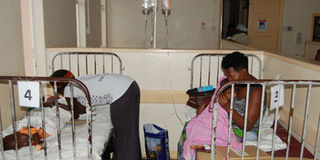Workers say proposed medical scheme contribution expensive

A woman carries a child in a health centre in Entebbe. Government intends to introduce a new health insurance scheme where workers must contribute 4 per cent of their salaries and their employers contribute the remaining 4 per cent to make it 8 per cent. FILE PHOTO
What you need to know:
Implication. Although millions of poor Ugandans are set to benefit from a subsidised health insurance cover currently under debate by the Cabinet, workers claim the compulsory contribution is expensive for them to support.
An estimated one million Ugandans formally employed in private and government sectors will have to dig deeper into their pockets to accommodate yet another mandatory 8 per cent contribution to National Health Insurance Scheme (NHIS).
The scheme, proposed in 2007 is premised on helping all Ugandans access basic health care services through compulsory contributions of 4 per cent of employee’s salary and the employer contributing another 4 per cent to make it 8 per cent per worker.
For the majority who cannot contribute to the scheme, government plans to pay the medical costs through a pool of pre-determined premium contributed to the scheme
Compulsory contributions.
Currently, workers pay other taxes including Pay As You Earn, charges on bank services, NSSF contributions, and other indirect taxes on daily goods and services bought.
The new scheme, according to government is expected to raise Shs313 billion in the first year of implementation, Shs673 billion in the third year and Shs26 million from the informal sector at the roll out.
Last week, Dr Francis Runumi, the commissioner planning in the Ministry of Health told this newspaper that the Bill is ready for debate in Parliament after consulting stakeholders, implying that soon, workers and their employers will have to start the contribution when the Bill becomes law.
Employers’ view
However, Ms Rosemary Ssenabulya, the executive director of Federation of Uganda Employers (FUE), an umbrella organisation of employers in Uganda, says the proposed contributions are costly for employers and employees.
“The NHIS is a good idea but it is costly to employers. We engaged the Ministry of Health and asked them to use some of the NSSF contributions to this scheme,” Ms Ssenabulya said.
She added, “We cannot contribute this entire amount when we have not yet seen the benefits. Let the scheme start with public servants before it is enrolled out.”
The employers are not alone in demanding the contributions to be revised.
Workers’ view
Mr Edwin Magono, an employee of a telecom company, says this contribution will reduce his net income yet there are other demanding needs such as education for his two children.
He is worried the scheme will encourage those who don’t contribute to produce many children because they know others will pay the bills.
The Uganda Medical Association has since also protested this Bill saying it was introducing a tax that would raise the cost of doing business in Uganda.
Also, insurance health providers through their association, the Uganda Insurers Association (UIA) question the viability of the scheme since every household is entitled to Shs160,000 which raises fears that contributors will in the end get mediocre services due to limited resources.
“We need to pay particular attention to the actual cost of medical care today vis-a-vis the amount of contributions that will be going into the Fund,” Ms Miriam Magala, the chief executive officer of UIA, said.
She added “Given that the major contributors will be Public Service and the private formal sectors who are less than one million for a population of more than 35 million, the viability of this scheme may be questionable,”
Government’s move questioned
Ms Magala further questions government’s intentions not to liberalise the Fund as is the case with NSSF and pension sectors now and wants to “force” all Ugandans to be part of a single scheme yet there are other private players who can provide the same services.
“We propose that the NHIS allows one to choose a scheme of their choice as long as the benefits it provides are not inferior to those prescribed by the law and each formally employed person and civil servant contributes one per cent directly and not four per cent.” Ms Magala said.
Workers’ salary deductions
5%
Percentage of a worker’s salary that is deducted towards National Social Security Fund
8%
Mandatory contribution of each worker towards the proposed national health insurance scheme of which 4 per cent is deducted from a worker’s salary while the employer contributes the remaining 4 per cent.
30%
Percentage of a worker’s salary that is deducted towards Pay As You Earn.




